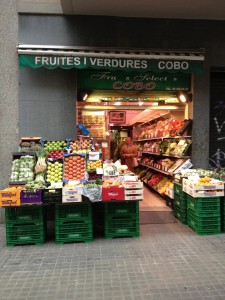 This information is taken from one of the books we were recommended to read and reference by a friend when we were tackling Natalia’s allergies and her extreme reactions to food not long after we arrived in Barcelona.
This information is taken from one of the books we were recommended to read and reference by a friend when we were tackling Natalia’s allergies and her extreme reactions to food not long after we arrived in Barcelona.
Like many people when they arrive here the change in the air, pollution, water, food and even the shock of moving country had taken a toll on her body.
We tried to deal with the symptoms of lethargy, nausea and her skin breaking out by ourselves until one evening after some months, she went into anaphylactic shock. It was the last straw.
It was the reason I started to really explore the world of detox and from this experience wrote my Detox Guide – a simple guide to purify your body at home in 14 days, as a guide for people to change their habits, understand how food really effects their lives and to be empowered by the choices we have especially of where what we eat comes from.
One of the most interesting changes that I had to address as part of this journey was the change of seasons. We were accustomed to eating in the complete opposite cycle of nature coming from Australia and I believe that it really took us a good 5 years for our bodies to adjust to the difference.
However, I think one of the wonderful things about living in Barcelona is the availability of seasonal produce (by seasonal produce I don’t just mean fruit and veg but also meat, fish, poultry, grains, mushrooms and herbs) and the ‘normality’ of eating within the season, and in a world where all types of food is available at any of the year despite where it originates from, Spain still has this tradition of enjoying local and regional produce – in SEASON.
This is what Dr Annemarie Colbin says about ‘Seasonal’
“Seasonal: To be in harmony with our environment, it is a good idea to choose summery feed it the summer, winery food in the winter. Fruits and vegetables in season are cheaper and do not lose nutrients like foods that have transported long distances.
They also taste better. Ina addition, season eating means salads and fruit in the summer, soups and stews in the winter. On the whole most people do eat that way. However, with the advent of refrigeration, freezer trucks, and worldwide transportation, we can get raspberries in December and yams in July. We also ignore this natural order when we go on restricted dies, such as raw food and juice regimes, which require us to eat lost of fruits and vegetables in winter, cooked and salty macrobiotic meals in the summer. With these diets we go out of sync with our environment, and we might feel cold in the winter, cranky and depressed in the summer.”
Dr Colbin goes on to say in regards to ‘Local’
“Local: Local produce tastes better, costs less, and is more nutritious because it is picked riper and does not lose nutrients in travel. The best restaurant chefs in the country have already discovered this and make an effort to obtain the freshest organically grown local foods, which they consider top quality.”
and about ‘In Harmony with Tradition’
“We should pay attention to what our ancestors ate and incorporate those foods into our modern diet whenever possible, maybe with some modifications (less salt, less fat, less sugar). For example our staple grain will taste more appropriate if our ancestors ate it as well – barley and oats from the British Isles; rye and wheat fro Europe; kasha from Eastern Europe and Russia; millet, teff (http://www.wisegeek.com/what-is-teff.htm#did-you-know), and sorghum from Africa, millet and rice from Asia; corn and quinoa from the Americas.”

Reference: Food and Healing by Dr Annemarie Colbin


February 18th, 2013 → 6:29 am @ mandydetox
0